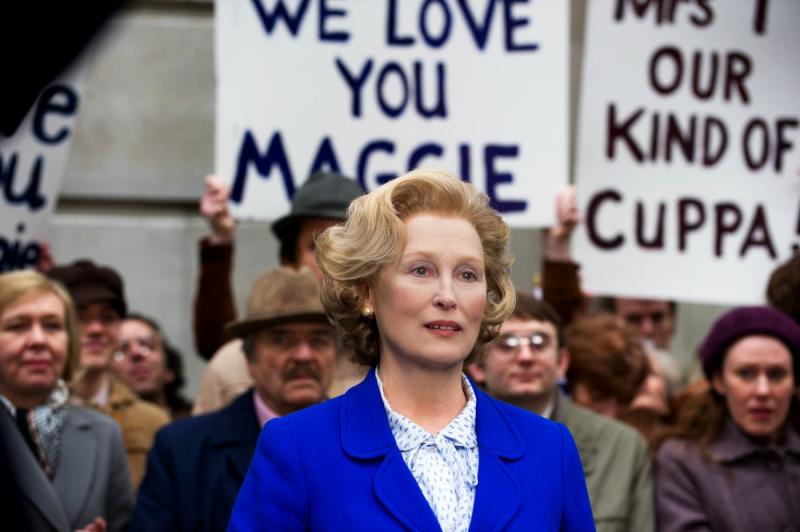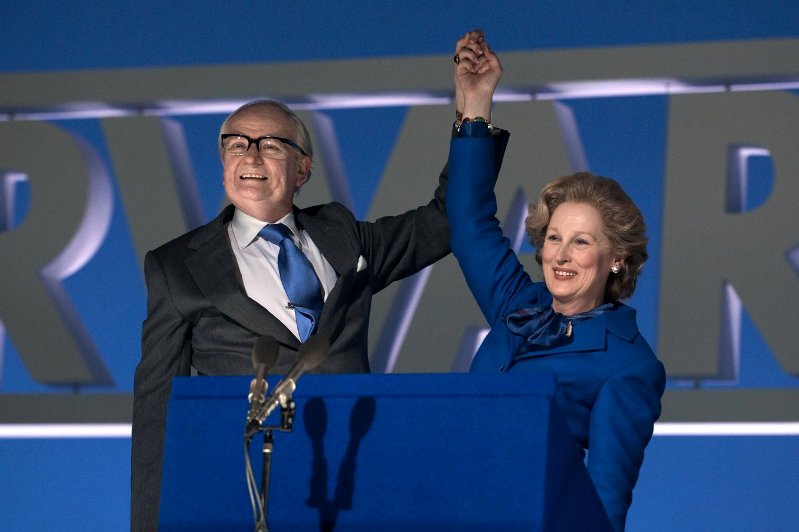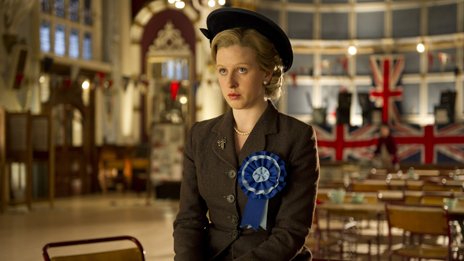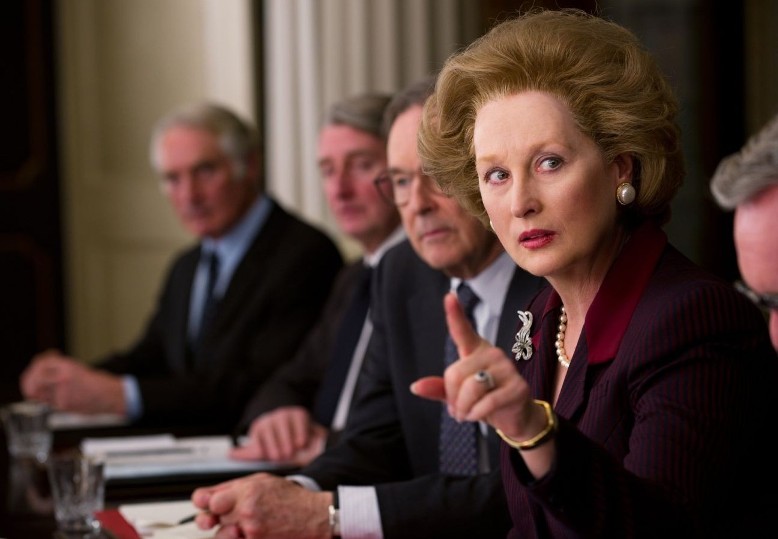The Iron Lady | reviews, news & interviews
The Iron Lady
The Iron Lady
Following the death of Margaret Thatcher, read again our review of last year's biopic with an Oscar-winning performance from Meryl Streep

There is a moment some way into The Iron Lady when its titular heroine presides over a celebratory domestic soiree. Around the table are arrayed ageing Tory nabobs and their peachy consorts, one of whom at the evening’s end tremulously approaches her hostess, sitting apart in an upright chair.
This is more or less the position taken up by The Iron Lady towards Baroness Thatcher. Whatever else you say about Meryl Streep’s reliably brilliant turn as an old woman recalling her triumphs, you may well find yourself as confused as Mrs T grappling with the onset of second childhood. Our first female Prime Minister has been a gift to satirists and dramatists alike down the years and kept many a gorgon-eyed lampooner and metal-breasted actress in work. But here is a new Thatcher: widowed and lonely, ministered to by carers and her long-suffering daughter Carol (Olivia Colman) while secretly conducting a private dialogue with the ghost of her dead husband Denis (Jim Broadbent, pictured below with Streep).
 But honestly, what’s it all for? Or more to the point, who is The Iron Lady actually aimed at? Other than Eurosceptics and Republicans, and perhaps the odd old softie in the Kremlin. Plus of course Streep fans. The modern Tory party won't welcome this timely reminder that terrorism, riots and recession do not belong to the dustbin of history. It won't presumably do big numbers in former pit villages or Buenos Aires. More than two decades on from her defenestration (replayed for maximum pathos here), Thatcher remains a divisive figure on a scale to out-marmite even Tony Blair. The difference is that in the trilogy of collaborations between Michael Sheen and writer Peter Morgan, Blair remains a sphinx whose motives are, intriguingly, never quite fathomable. The Queen is The Iron Lady’s closest cinematic relative. It had the distinct advantage of visiting the inner life of a female British institution in whom far fewer can find complaint, and confining itself to a structurally robust week of a high drama.
But honestly, what’s it all for? Or more to the point, who is The Iron Lady actually aimed at? Other than Eurosceptics and Republicans, and perhaps the odd old softie in the Kremlin. Plus of course Streep fans. The modern Tory party won't welcome this timely reminder that terrorism, riots and recession do not belong to the dustbin of history. It won't presumably do big numbers in former pit villages or Buenos Aires. More than two decades on from her defenestration (replayed for maximum pathos here), Thatcher remains a divisive figure on a scale to out-marmite even Tony Blair. The difference is that in the trilogy of collaborations between Michael Sheen and writer Peter Morgan, Blair remains a sphinx whose motives are, intriguingly, never quite fathomable. The Queen is The Iron Lady’s closest cinematic relative. It had the distinct advantage of visiting the inner life of a female British institution in whom far fewer can find complaint, and confining itself to a structurally robust week of a high drama.
Here instead we take the tour of Thatcher’s life and times in that Reliant Robin of storytelling tropes, the flashback. It’s somewhat slow to ignite and, in director Phyllida Lloyd's vision of Thatcher's world, curiously claustrophobic: this is a life played out in rooms. For a good 20 minutes you are entitled to wonder where it's all heading as Thatcher fusses over what to wear with a husband who isn’t there. If her story is intended to say something universal about grief and dementia, a mighty gamble has been taken. It’s exceptionally difficult to buy into the notion of the ultra-ballsy leaderene as a figure of pathos, and this is not an obstacle the film ever overcomes.
Why that is one can only speculate. On writing duty is Abi Morgan, whose heart doesn’t seem to be in the business of hagiography. In this version of a Prime Minister's back story, a policy lightbulb goes on when she's giving her daughter a driving lesson. "Right turn," she tells herself. Please, no diagrams.
 As the flashbacks come in more frequent waves, we get a familiar story of female empowerment that is easier to root for. The struggle of the shopkeeper’s daughter (Alexandra Roach, pictured left) to make her way in a man’s world is engagingly told. Accelerating swiftly forward to her bid for the party leadership, Airey Neave (Nicholas Farrell) is soon stiffening her spine and softening her image before being blown up by the IRA. (Question: was Thatcher in the Palace of Westminster carpark when the bomb was detonated? Answer: she was now.) And so the headlines of her premiership come and go as if between the Big Ben bongs of News at Ten: the recession, the miners’ strike, the Brighton bomb, the Falklands ("sink it") - all in that historically inaccurate but dramatically convenient order. And then, with a quick nod to the ERM and the poll tax, all of a sudden they’re ousting her.
As the flashbacks come in more frequent waves, we get a familiar story of female empowerment that is easier to root for. The struggle of the shopkeeper’s daughter (Alexandra Roach, pictured left) to make her way in a man’s world is engagingly told. Accelerating swiftly forward to her bid for the party leadership, Airey Neave (Nicholas Farrell) is soon stiffening her spine and softening her image before being blown up by the IRA. (Question: was Thatcher in the Palace of Westminster carpark when the bomb was detonated? Answer: she was now.) And so the headlines of her premiership come and go as if between the Big Ben bongs of News at Ten: the recession, the miners’ strike, the Brighton bomb, the Falklands ("sink it") - all in that historically inaccurate but dramatically convenient order. And then, with a quick nod to the ERM and the poll tax, all of a sudden they’re ousting her.
 There is oddly little attempt to look at Thatcher's impact from an alternative angle. Crowds are shown hating or loving her, sometimes in newsreel footage, but you will hunt in vain for evidence that her policies might have taken an emotional toll on Thatcher herself. Adamantine self-belief, after all, is what made Thatcher Thatcher. It's just not what makes a dramatic character. Instead, Streep is asked to portray a woman in her prime whose burden it was to oscillate between gender stereotypes: “I have done battle every single day of my life,” she growls at Al Haig, then reaches for the teapot: “Now shall I be mother?” “You haven’t had to fight!” she roars at her cabinet of entitled milksops. “It’s all been given to you.” (Every British character actor of any note pops up in pinstripes, including Richard E Grant, an alarming sight as Heseltine.)
There is oddly little attempt to look at Thatcher's impact from an alternative angle. Crowds are shown hating or loving her, sometimes in newsreel footage, but you will hunt in vain for evidence that her policies might have taken an emotional toll on Thatcher herself. Adamantine self-belief, after all, is what made Thatcher Thatcher. It's just not what makes a dramatic character. Instead, Streep is asked to portray a woman in her prime whose burden it was to oscillate between gender stereotypes: “I have done battle every single day of my life,” she growls at Al Haig, then reaches for the teapot: “Now shall I be mother?” “You haven’t had to fight!” she roars at her cabinet of entitled milksops. “It’s all been given to you.” (Every British character actor of any note pops up in pinstripes, including Richard E Grant, an alarming sight as Heseltine.)
Streep - previously directed by Lloyd in Mamma Mia! - applies all her forensic nous to pick apart and piece together not only a voice but also a manner and an attitude. It's an all but flawless turn, and often funny (no matter that the real Maggie isn't equipped with a sense of humour). She more or less disappears behind the wig and the caked make-up, with only the faintest traces of Streepery detectable in the wry sideways flicker of an eyeball, the merest tilt of a head. The other Best Actress contenders had better start pretending their “aw shucks I didn’t win” looks for the awards season now.
The heart of The Iron Lady, if it has one, is in the interstices, as an old woman confronts the indignities of age. Broadbent in these exchanges is Broadbent, folksy and perky and probably not very like Denis Thatcher at all. When their final parting comes, posited as a kind of cathartic denouement, it's neither moving nor credible. The real meat is in the beautiful interplay between Streep and the superlative Colman, where the actual cost of Thatcher's career is quietly but keenly measured: the loving daughter, less than loved by the mother who was never there. Alas these moments of truth are all too fleeting, because The Iron Lady has no interest in asking hard questions of its subject. Streep is magnificent, but this is a dewy-eyed exoneration.
Watch the trailer to The Iron Lady
rating
Share this article
Add comment
The future of Arts Journalism
You can stop theartsdesk.com closing!
We urgently need financing to survive. Our fundraising drive has thus far raised £49,000 but we need to reach £100,000 or we will be forced to close. Please contribute here: https://gofund.me/c3f6033d
And if you can forward this information to anyone who might assist, we’d be grateful.

Subscribe to theartsdesk.com
Thank you for continuing to read our work on theartsdesk.com. For unlimited access to every article in its entirety, including our archive of more than 15,000 pieces, we're asking for £5 per month or £40 per year. We feel it's a very good deal, and hope you do too.
To take a subscription now simply click here.
And if you're looking for that extra gift for a friend or family member, why not treat them to a theartsdesk.com gift subscription?
more Film
 Little Trouble Girls review - masterful debut breathes new life into a girl's sexual awakening
Urska Dukic's study of a confused Catholic teenager is exquisitely realised
Little Trouble Girls review - masterful debut breathes new life into a girl's sexual awakening
Urska Dukic's study of a confused Catholic teenager is exquisitely realised
 Young Mothers review - the Dardennes explore teenage motherhood in compelling drama
Life after birth: five young mothers in Liège struggle to provide for their babies
Young Mothers review - the Dardennes explore teenage motherhood in compelling drama
Life after birth: five young mothers in Liège struggle to provide for their babies
 Blu-ray: Finis Terrae
Bleak but compelling semi-documentary, filmed on location in Brittany
Blu-ray: Finis Terrae
Bleak but compelling semi-documentary, filmed on location in Brittany
 Oslo Stories Trilogy: Sex review - sexual identity slips, hurts and heals
A quietly visionary series concludes with two chimney sweeps' awkward sexual liberation
Oslo Stories Trilogy: Sex review - sexual identity slips, hurts and heals
A quietly visionary series concludes with two chimney sweeps' awkward sexual liberation
 Sorry, Baby review - the healing power of friendship in the aftermath of sexual assault
Eva Victor writes, directs and stars in their endearing debut feature
Sorry, Baby review - the healing power of friendship in the aftermath of sexual assault
Eva Victor writes, directs and stars in their endearing debut feature
 Blu-ray: Who Wants to Kill Jessie?
Fast-paced and visually inventive Czech comedy
Blu-ray: Who Wants to Kill Jessie?
Fast-paced and visually inventive Czech comedy
 Oslo Stories Trilogy: Love review - freed love
Gay cruising offers straight female lessons in a heady ode to urban connection
Oslo Stories Trilogy: Love review - freed love
Gay cruising offers straight female lessons in a heady ode to urban connection
 Beating Hearts review - kiss kiss, slam slam
Romance and clobberings in a so-so French melodrama
Beating Hearts review - kiss kiss, slam slam
Romance and clobberings in a so-so French melodrama
 Materialists review - a misfiring romcom or an undercooked satire?
Writer-director Celine Song's latest can't decide what kind of film it is
Materialists review - a misfiring romcom or an undercooked satire?
Writer-director Celine Song's latest can't decide what kind of film it is
 theartsdesk Q&A: actor Leonie Benesch on playing an overburdened nurse in the Swiss drama 'Late Shift'
The Guildhall-trained German star talks about the enormous pressures placed on nurses and her admiration for British films and TV
theartsdesk Q&A: actor Leonie Benesch on playing an overburdened nurse in the Swiss drama 'Late Shift'
The Guildhall-trained German star talks about the enormous pressures placed on nurses and her admiration for British films and TV
 Freakier Friday review - body-swapping gone ballistic
Lindsay Lohan and Jamie Lee Curtis's comedy sequel jumbles up more than their daughter-mother duo
Freakier Friday review - body-swapping gone ballistic
Lindsay Lohan and Jamie Lee Curtis's comedy sequel jumbles up more than their daughter-mother duo

Comments
A convincing and extremely
So well written: bejesus that
An intriguing film. As